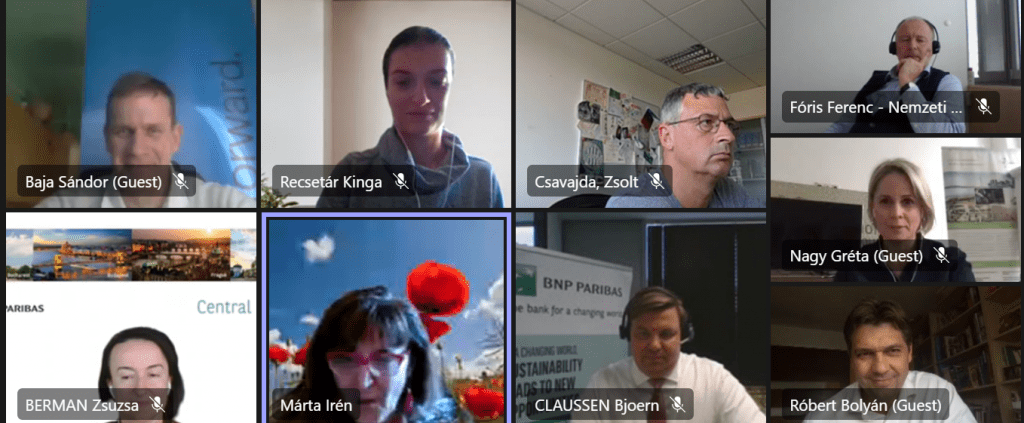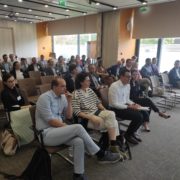We held our fourth ESG working group meeting this year
Our fourth ESG working group meeting on 19th October exceeded all our expectations. Our guests speakers were Sándor Baja, Managing Director of Randstad Hungary Kft. and Björn Claussen, Regional Head of Multinational Coverage – Central Europe BNP Paribas, winner of the “For a Sustainable Future” Award in Change Leader category.
Sándor led us through the current Hungarian labor market situation, summarizing the challenges and possibilities, partially driven by Covid-19. We can currently see a clear gap between the number of people retiring vs. the number of 18 years old population. As the Eastern European countries are seemed to recover faster than the Western countries, we can witness some migration back to Hungary. Additional challenges are given by the facts that governance is decreasing the number of work permit issued, meanwhile the number of high education graduates are also decreasing. Hungary is not well prepared for the future job market, where continuous automation plays a key role, making mid-level jobs disappear. Today we can say that automation is creating more jobs then eliminates. STEAM education is rising in the western countries while in Hungary we are only around 20% and female students are even more underrepresented in the area. Regarding mobility we see a rising trend on urbanization as well as connecting small villages to the big company circulation due to remote and hybrid work possibilities.

Sándor also shared a new Randstad survey, what was conducted with the involvement of 7600 people, covering the topics of Covid-19 effect, employer of choice, remote work, employee retention and employee drivers.
Some of the key highlights are the following:
- The IT sector is currently the most attractive, followed by telecommunication and business services. Retail industry is gaining popularity and currently finance is the less attractive option for the candidates.
- There is a clear message for companies about remote work. Only 10% would like to go back to the office 100%, 25% prefers not to return at all and 65% is opting for hybrid solution.
- There were job losses due to Covid in a higher % then we see in the official statistics, but many people were able to integrate to another sector. In 2021 21% was still worried to lose their job due to Covid-19.
- The topmost important drivers are attractive salary and benefits, pleasant working atmosphere, job security, financial health, and good work-life balance. Sándor was suggesting using these parameters for job postings.
- The results also show that from ESG point of view, giving back to society and company reputation are on the 9th and 10th place of the list. For around 30% of the people is important the ESG factor when looking into employers’ offering. We can see a bit higher number in case of women and high education graduates. Sándor was suggesting keeping this information available, but not to build the job advertising strategy around it.
Björn, representing the finance industry, started with a reflection on the Randstad report, how the sector lost its charm and now aims to offer more attractive opportunities for candidates. The role of a finance expert is becoming more and more advisory, who supports their clients to gain knowledge on global emerging trends, risks, and opportunities for a sustainable future. BNP Paribas has been carbon neutral on its operational scope since 2017 and was recognized multiple times for their work around ESG and sustainability worldwide.
The bank is redesigning its strategy to be even more action oriented by realigning their activities with the SDGs and how they can land money in another way. 15% of their investments is contributing strictly to the achievement of the UN SDGs. During the last 5 years they tripled their investment on renewable energy sector and reached their goal with two years in advance. They also started to invest in startups for energy, energy transformation, and efficiency areas, where after the 1st 100 million EUR spent, they partnered with another organization to further invest in the energy transition.

Bjorn also shared with us, what are the roadblock in their journey and how they are trying to overcome them. To reach their 2 Celsius commitment, BNP Paribas is gradually exiting some of the key industries as tobacco and coal. To make clients realize that the change is happening, they roll-out their exit strategies at the same time on a global scale, talking to clients one by one. Challenges are differently present in countries, where the governance is not committed on the same way towards the massive emission reduction. Beside the advisory approach, Bjorn continuously highlighted the importance of education and raising awareness around ESG, what is also part of their client management strategy.
BNP Paribas also conducted a survey on ESG recently. Some of the core findings are the following:
- ESG know-how: 3 groups identified, leaders, explorers, observers
- More investors are integrating ESG in their portfolio, data remains the primary barrier for integration and the social pillar is the hardest to measure
- Investors engage with clients about ESG as part of their strategy
- Shift from marketing to brand reputation as primary driver for ESGs
To watch a short video about the survey, click here.
Thanks for our sponsors:











Leave a Reply
Want to join the discussion?Feel free to contribute!